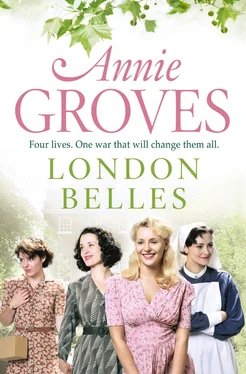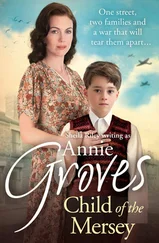Ted made it all seem so simple and so sensible. He made her feel better, somehow.
‘I’ll still lose my job. Mr Smith told me that I’d got to learn the stations on every single line, or else.’
‘Well, that’s easy enough to do,’ Ted told her.
Agnes’s eyes widened with hope and then darkened with doubt.
‘I mean it,’ Ted assured her, adding, ‘I could teach them to you if you wanted. See, my dad worked on the underground as a driver all his life, and now I’m doing the same. Grown up with knowing what the lines and the stations are, I suppose. Dad used to sing the names to me when I was a kid and lying in bed.’
‘Sing them to you? You mean like . . . like hymns?’ Agnes asked in amazement.
‘Well, not hymns, perhaps, but like what you might hear down at the Odeon, you know . . .’ He cleared his throat and began to sing in a pleasant baritone, as though to a marching tune that he had made up.
‘Here’s to the Piccadilly –
Cockfosters, Oakwood and Southgate,
Arnos Grove, Bounds Green and Wood Green,
Turnpike Lane, Manor House and Finsbury
Park,
Ar – sen – al
Holloway Road, Caledonian Road
King’s Cross and Russell Square,
Holborn, Covent Garden and Leicester Square.’
Agnes was entranced. Ted made learning the names of the lines and their stations seem such fun.
Her obvious awe and delight had Ted’s chest swelling with pride. He was an ordinary-looking lad, of only middling height and a bit on the thin side, with mouse-brown hair and vividly blue eyes. His smile was his best feature in his opinion, and his ears his worse because they stuck out so much. He had long ago accustomed himself to the fact that his looks weren’t the sort that girls made a beeline for, so he’d learned to compensate for that with his friendliness – not that he was the kind to go chasing after girls. He’d got his mum to help out after all. But something about Agnes’s plight, coupled with her awed delight, touched his heart. Ted reckoned that the poor little thing needed someone to look out for her and give her a hand, and he’d as soon do it himself as see her taken in by some lad who might not do right by her. There were plenty of that kind about, and she obviously hadn’t a clue about how to look after herself properly.
‘Look, I’ll tell you what,’ he offered. ‘How about you and me meet up every teatime when you come off work, and I teach you the names of the lines and their stations?’
‘You’d do that for me?’ Agnes didn’t even try to conceal her disbelief.
‘I’ve just said so, haven’t I?’
For a moment euphoria filled Agnes but then her ingrained lack of self-confidence swamped it.
‘It’s very kind of you but I just don’t think I’ll be good enough to learn them properly.’
‘Course you will,’ Ted assured her. ‘If my old man could teach me and I could learn, then I reckon I can teach you and you can learn.’
‘Does your father still drive the trains?’
Ted shook his head. ‘He’s dead. Got killed upsides in an accident six years back. It was a foggy night and he got hit by a bus. Didn’t stand a chance. Killed him straight off.’
He said it so matter-of-factly that Agnes could only stifle her shock to say politely, ‘How awful.’
‘Knocked us all for six when it happened, but we’ve got used to it now. Course, it’s meant that I’ve had to help Mum out with my own wages and take a bit of a firm line with the girls when they start giving her their cheek, and acting up.’
‘How old are your sisters?’ Agnes asked him shyly. She didn’t really know anyone who had a real family. She’d never met someone who was as frank and open as Ted was. His frankness enabled her to ask the kind of questions she would never normally have dreamed of asking.
‘Marie, she’s the eldest, she’s ten, and then there’s Sonia, who’s eight.’ He paused and then added, ‘In case you’re wondering how come I’m so much older, it’s because there was a couple of others – both boys – that died young. Talks about ’em still, Ma does, and then gets herself in a state about them, poor little tykes. Now, I’ve got to get on duty and you’ve got to get yourself over to – what was it? – Article Row, and get yourself sorted out. Then tomorrow teatime you and me will meet up here and get started off learning you your lines and stations.’
He was already standing up so Agnes did the same, telling him emotionally as they left the teashop, ‘You’ve been so kind coming to help me just when I thought . . . You’re like a Good Samaritan.’
‘Aw, get away with you, it was nothing,’ Ted told her, looking embarrassed. ‘I’d do the same for any kid that was in the state you’d got yourself into. Now you remember, tomorrow teatime here. Right?’
‘Right,’ Agnes told him.
The warm happy glow she felt from Ted’s kindness accompanied her as far as the entrance to Article Row, but once she could see how nice the houses in the Row looked, she felt her confidence start to slip away, and at the same time a feeling growing in her that if she couldn’t stay at the orphanage then this would be a lovely place to live. Out of the corner of her eye she could see two women walking on the pavement on the other side of the street, going in the opposite direction to her, both of them glancing at her, their curiosity making her feel self-conscious and awkward. Number 13, she’d been told; that was the next house. Now her tummy had begun to cramp nervously.
Inside her kitchen, Olive had just sunk down into a chair to drink the very welcome cup of tea Tilly had brewed for her. Although she was glad to have both her rooms let, she would really rather not have had a girl like Dulcie as one of her lodgers. Her maternal instincts told her that Dulcie was not likely to be a good influence on Tilly, who was just at that age when she wanted to be grown up and go out to dances, and, of course, meet boys.
The unexpected knock on the door surprised them both.
‘I hope that isn’t Nancy from next door coming round to complain about something,’ Olive sighed, getting up to go and see who it was.
The thin mousy-haired and obviously anxious girl, standing outside in her grey serge underground uniform immediately broke into nervous speech.
‘Please, miss, I’m Agnes and I’m ever so sorry. I was supposed to come yesterday only I didn’t. It’s about the room. Matron at the orphanage said that you had a room for me.’
Olive’s heart sank. The girl looked so on edge, and so much more the kind of lodger she had expected and wanted than Dulcie, who had now taken her room.
‘I’m sorry,’ she said with genuine regret, ‘but the room’s already gone, I’m afraid. When you didn’t come yesterday, I thought you didn’t want it.’
Olive’s words made Agnes feel as though a bucket of icy cold water had been thrown over her, drowning the hopes she had begun to build up and leaving her feeling as close to tears as she had done when Ted had found her on the stairs.
Poor girl, Olive thought, seeing the shocked despair on Agnes’s face. Tears weren’t very far away, Olive could tell.
‘Look, why don’t you come in and have a cup of tea?’ she offered kindly. ‘It’s a warm evening and you’ll have been working all day.’
‘Oh, no, you’re very kind but I don’t want to be a nuisance,’ Agnes began, but before she could turn to walk away, Olive was reaching for her arm and drawing her inside, guiding her down the hallway and into the kitchen, where a girl of her own age, but much prettier than she, with her dark curls and cherry-red lips, was standing in front of the sink, drinking a cup of tea.
‘Tilly, this is Agnes who was supposed to come yesterday about the room. Agnes, this is my daughter Tilly,’ Olive explained, adding, ‘I’ve told Agnes that I’ve already let the room, but she’s going to have a cup of tea with us before she goes home.’
Читать дальше












